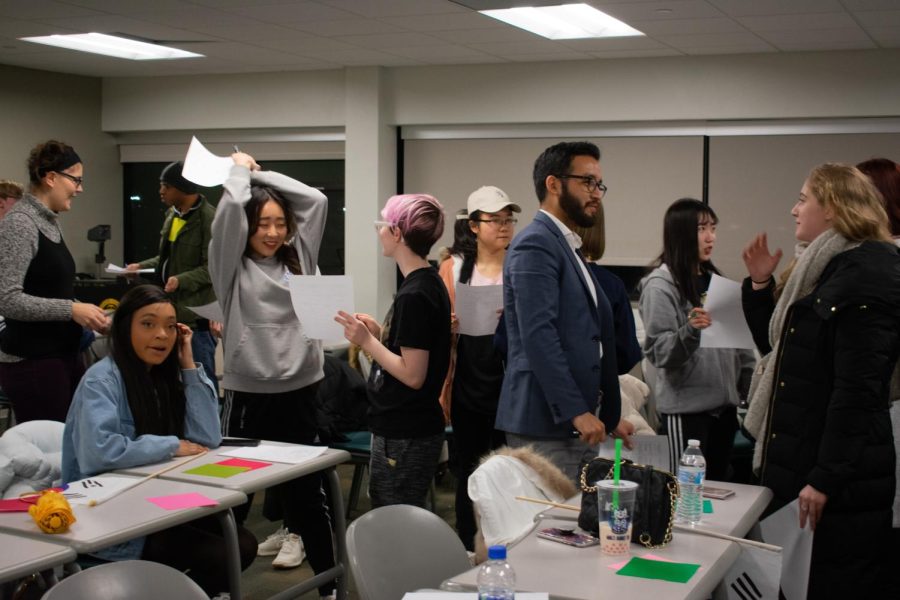Kent State club aims to teach, discuss Korean culture
February 27, 2019
Few organizations on Kent State’s campus get more extreme reactions than the Korean Culture Club. Students often describe it as cringey or launch accusations of cultural appropriation.
The president and founder of the Korean Culture Club is Austin Bashore, a senior teaching English as a second language major with a passion for conservationism, activism and Korea. In high school, Bashore said his sleep schedule was so inverted that he would spend all day sleeping and all night playing video games with whomever was online at the time, which ended up being mostly Korean gamers. He eventually learned some Korean to communicate with his gamer friends, and that’s how his fascination with Korea began.
When Bashore first arrived on the Kent State campus, he found out there was no club or major involving Korean culture or language. So about four years ago, he and a few upperclassmen established the Korean Culture Club.
“It’s given me an outlet and a community to feel engaged with. I don’t feel like I’m alone,” he said.
Club meetings consist of a mixture of lectures and activities and cover topics like issues fitting in when traveling in Korea, language lessons and politics. They even have a lesson on North Korea once a semester.
Despite the broad range of covered topics, Bashore thinks many students have misconceptions about the Korean Culture Club.
“They just don’t know the club. A lot of people think we’re creepy Korean-pop fans who fetishize Asian men,” Bashore said. Bashore also denies any accusations of cultural appropriation within the club. “Cultural appropriation is disgusting and borderline racist,” he said.
Although Bashore denounced the cultural appropriation of Korea, he acknowledged there is only one active Korean member and only a few Korean students who attend occasionally. He does hope more Korean students will join so they can offer insights about the culture that he may not be able to, but he recognizes the club may not appeal to international Korean students because they may be more interested in American-oriented experiences.
Rachel Stoll, a junior fashion merchandising major, has been in the club since her freshman year and isn’t sure where she’d be without it.
“The first meeting I made two of my closest friends in college so far,” Stoll said. “I think this is it for me … I haven’t really found any other club that I mesh with.”
Stoll was interested in studying the Korean language in college but couldn’t find many options in Ohio. But when she came across Kent State’s Korean Culture Club, she decided to become a Golden Flash. Stoll fell into a leadership position this semester when the ex-vice president stepped down and left a vacancy, but she is now eyeing the presidency when Bashore graduates.
A key misconception that surrounds the club is the role of K-pop, she said. Often outsiders, and sometimes club members, think the only aspect to the club is K-pop. An end-of-year survey within the club last year showed that even its own members think too much time has been spent on K-pop during meetings.
“We are trying to use those responses and affect the club,” Stoll said. To remedy this, meetings this semester will cover a more diverse array of topics and will also be generally aimed at helping students prepare to study abroad in Korea, she said.
Hyojin Jeong, a freshman international exchange student, is the only active Korean member in the organization. Despite the lack of Korean voices, Jeong made sure to express that she thinks the club is about spreading culture, not stealing it. She sees the U.S. as a melting pot of identities — one where cultures can’t be claimed with exclusivity.
She does worry that students may misinterpret her views and opinions as representative of all Koreans, and sometimes she gets overwhelmed by the attention from club members.
“I felt nervous and uncomfortable because I was worried … for my friends to think my opinion is all Koreans’ opinion,” Jeong said. “I want more Koreans to join this club.”
That being said, she says the club helps her feel safe and accepted in the larger Kent community, where she sometimes faces discrimination.
“People said to me some bad words, but I couldn’t understand because my English was not that good. But I could feel it was a bad word,” she said. “Whenever I felt gloomy and felt down, I felt I can heal my mind in the club.”
The next Korean Culture Club meeting was filled with cheerful greeters who handed colorful sheets of origami paper to the students funneling in. South Korean flags were strewn about the room, which was populated with a diverse group of students. They laughed and played ice breaker games then learned about Korean dress dating back to 57 B.C.
One member reiterated with a casual confidence that the club does not culturally appropriate, and that it’s so much more than Koreaboos (which is a term for Korea fanatics) and K-pop.
Alana Tolliver, a sophomore fashion design student, is drawn to the colorful, youthful energy of Korean fashion week and street style.
“I just find everything more interesting about (Korean culture),” Tolliver said.
Overall, Bashore hopes to challenge students to see beyond their preconceptions of the Korean Culture Club. “It’s a very multifaceted thing,” he said.
Editor’s note: Bashore’s original description saying he had an interest in “conservatism” was corrected to say “conservationism.”
Madison Patterson is a features writer. Contact her at [email protected].












